
For our series, 1:1 with Engineering Leaders, Code Climate and Codecademy for Business are speaking to managers and VPs about their career journey, leadership strategies, and advice for the next generation of engineers. Check out our previous interviews with Tara Ellis, Manager, UI Engineering at Netflix, Brooks Swinnerton, Senior Engineering Manager at GitHub, and Gergely Nemeth, Group Engineering Manager at Intuit.
Below is an excerpt from our conversation with Lena Reinhard, Vice President of Product Engineering at CircleCI, who shared her thoughts on leadership, running distributed teams, and helping team members level up. Edited for length and clarity.
For Lena’s advice for early-career engineers, visit the Codecademy blog.
Tell us about your current role and how you got to where you are.
Lena Reinhard, Vice President of Product Engineering, CircleCI: I’m VP of Product Engineering with CircleCI. I joined CircleCI in June, 2018, so I’ve been here for two years and a quarter. I initially joined as Director of Engineering to help scale the organization, and then formally moved into this role in March this year.
I lead a globally distributed team, and the biggest part of my work is making sure that everyone in the organization understands our strategy direction, where we’re looking to go, and that they have the context that they need.
I noticed your personal website showcases some of your creative hobbies, so I’m curious, how do you blend the creative and the technical sides of your interests? Is there a creative side to engineering? To leadership?
I am not an engineer myself, that’s one thing probably worth highlighting. I have dabbled in engineering, but I am not as good as even our more junior engineers on the team, and it’s also not my main job. Of course there’s a lot technical about my work, and a there’s a lot that’s about the business side of things, but at the same time, as you mention, I do have that urge to be creative and live out those things.
To me, it’s more about what being creative actually means. A lot of my job is about being imaginative and using that imagination to solve problems. There’s a lot of really interesting problems to solve, and to solve at scale. I also have to be imaginative about not only what we’re seeing today, but also what’s to come: How’s the organization going to evolve? What does that mean for our business overall, for the people on our teams? So I use a lot of creativity to approach problem-solving.
I make time every day for strategic thinking. I usually start my day with that, doing some free-form writing, then working through a few questions that I answer every day around how the organization is doing, and what I need to pay more attention to.
A big part of my role is also about imagining the organization we want to be and helping people understand that. And then I work with my team to determine how we’re going to get there.
Can you talk a little bit about how you came to be a manager? Where did you start, and then at what point did you start managing people? And did you know that you always wanted to do that?
I have always gravitated towards leadership. I used to lead projects in school, and in the sports that I did, I was the captain of the team. But I never thought I would be a manager. I wouldn’t have known what the role would entail, and what that actually would mean, I would’ve thought it meant bossing people around all day because of the kinds of things you see in movies.
Early on, I started by mentoring some people and coaching trainees at one of my first jobs, then I moved towards growing and managing open-source communities, and slowly gravitated towards more formal leadership roles. I ended up co-founding a company and becoming a CEO there, and with that it became a bit more formalized. From there I moved onto building engineering teams.
I built skills around managing people, so things like project management, how to work with people, dealing with conflict, setting direction, and those kinds of things. I developed those skills through other roles, and so I had kind of accumulated important skills and traits by the time I actually moved into a management role. It wasn’t a career goal, but I’m really glad I ended up there.
That seems to be a common theme. People tend to not know what managers do, or don’t trust them.
I think I’ve learned the most about being a manager from the worst managers I’ve had. Having talked to many managers about this, it also seems to be a bit of a common trait. The actual training is not really formalized, and there’s not necessarily been a lot of role models.
I also think there’s been a big shift in management’s role, even just over the last five years, let alone the last 10 or 20. My understanding of how management works and what makes a good manager has changed dramatically from where I am now versus the first Hollywood movies I saw with managers yelling at people.
What do you believe is the role of a manager on an engineering team, if their role isn’t to be the most senior technical expert? And then, what’s the role of a leader, and what’s the difference between the two?
Management is a role, it’s a function, and it comes with a certain set of responsibilities and accountability. I personally treat it very distinctly from leadership, because leadership in itself is a very distinct skill. It’s a way of behaving yourself, conducting yourself in the world, and it’s also about how you interact with others. Ideally managers are leaders, but not all leaders need to be managers. I often tell my teams, because we’re a globally distributed team, I believe we need leadership at all levels. We have a career growth framework for engineers where leadership skills are a trait that’s required of more junior engineers, up to being very senior, because I think it’s a fundamental element of what we need to carry the organization forward as a distributed team. The more people are connected with what we’re looking to do, the more they can understand that purpose and rally the rest of the team, the better for us. That’s why I encourage people to build out leadership skills, no matter what role they’re in.
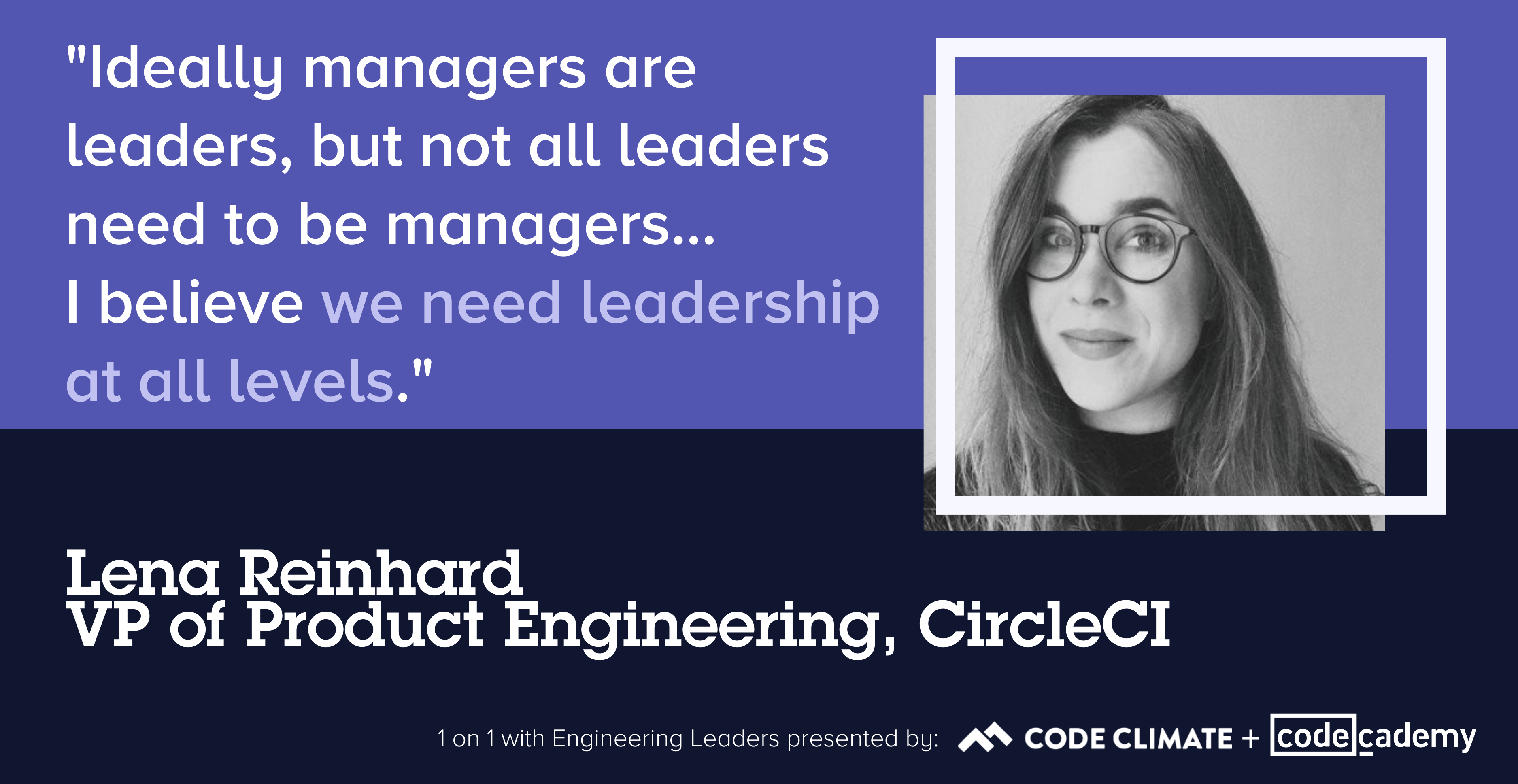
I also think that it’s important for engineers specifically to be able to grow their careers without having to move into management. I view management and engineering as two distinctly different career paths, and I’m very happy to support people switching back and forth between them — we’ve had that multiple times in my current organization and it’s been really great — but it shouldn’t be that in order to move forward and progress in your career you have to become a manager. I think it sets people up for failure, worse case, and it sets them up for doing work that they don’t want to do because it’s just not everyone’s cup of tea. I like my job, but I also know not everyone wants it.
Managers are ultimately responsible and accountable for the business success of our teams. We have to focus on connection, communication, and collaboration on teams. There’s a lot of research, of course, on high-performing teams and what those teams need to be successful, but basically it’s about supporting teams in growing and becoming cohesive, helping engineers on the team grow, and helping teams deliver against the business’s goals. And then it’s everything that goes into that, because that’s, surprisingly, a lot of work.
What are your biggest challenges as a leader?
The one thing I keep saying is just scale. I lead an engineering organization at a hyper-growth company. We’ve been in a state like that for a couple of years now, and it impacts us in a variety of ways. It impacts us from an organizational perspective, since we want to make sure we’re appropriately supporting the people who we already have in the organization, as well as the ones that we’re looking to bring on in the future. And so that’s related to our processes and how we hire and onboard, and how we support career growth.
The other side of it is of course the technical side, making sure that our systems are set up to support the user base that we have, as well as the user base that we’re striving to have in the future.
So scale is definitely a big thing because it comes with a lot of change. It basically means being in a state of continuous change, always evolving and always adjusting how we operate as a team. Within that, I also have to maintain a good sense of what’s going on, since I’m relatively removed from a lot of other leaders in our organization.
With the growth that we’re going through, I also think a lot about scaling culture. We want to maintain parts of our culture, but then also constantly adapt in a way that’s healthy and that’s aligned with our values. Because I also don’t believe that trying to preserve the culture that you had as an organization when you were 20 people should be the goal.
We also have to make sure that we are always working on the most impactful thing for our customers, as well as for our organization. In a state of hyper growth, it’s easy to get into an “everything is important and urgent” mode, and it’s a challenge to work through that, for myself but also for my team, making sure that they know the priorities and that they’re able to shift their work accordingly.
I also put a lot of work into managing my reports, my staff, and my peers, and then of course upwards and then around into other parts of the company. That’s probably one of the biggest parts of my job.
Are any of these challenges remote-specific? You mentioned you’re a globally distributed team, so how does that complicate things for you?
It complicates everything. I love it, and I always feel like I need to add that as a disclaimer. I’m a big fan of distributed teams, but it also means we have to be more mindful of how we work. We have to be a bit more intentional, because stuff just doesn’t happen organically. My remote-specific challenges are mostly around time zones. I fortunately have an assistant who helps with the logistics of global distribution, which has been great, but that’s more the day-to-day.
The other big challenge is everything around change management and cascading communication. In a co-located team, at least up until the end of last year I guess, people could easily summon everyone into a room and say, “Well, here’s the change and here’s what’s happening,” and then everyone gets on with their day. That’s of course a very simplified example, but for us, anything that we’re looking to change usually requires quite careful planning.
Especially in a constantly evolving environment, we also have to be mindful that there are limitations to how much change an organization can digest at any point in time. We try to be strategic about where we think we can evolve to a desired status quo, versus where we actually need to change something.
This is a very broad question, but how do you drive high performance on your team, and how does that change if you’re working with an individual or the team as a whole?
There are a couple different frameworks. One is a career growth framework that we use for goal-setting and expectation-setting conversations on a quarterly basis, and then we do check-ins again over time. We also use that as a basis for 360 feedback and career growth conversations for the longer term. So that’s one pillar, which is more towards the individual.
At the team level, we do OKR-setting as a goal framework, also on a quarterly basis. Though we don’t use OKRs at the individual level, we do try to align individual goals towards the team’s OKRs. So, for example, if a team has goals around delivering on a specific service and someone on their team wants to get better at knowledge management, they might work on documentation around that specific service, or make sure that they’re onboarding someone new to that area.
We try to connect the individual’s career goals with what the team is actively working on. It helps create opportunities for people to work on their career goals in the short term, rather than pushing that down the line.
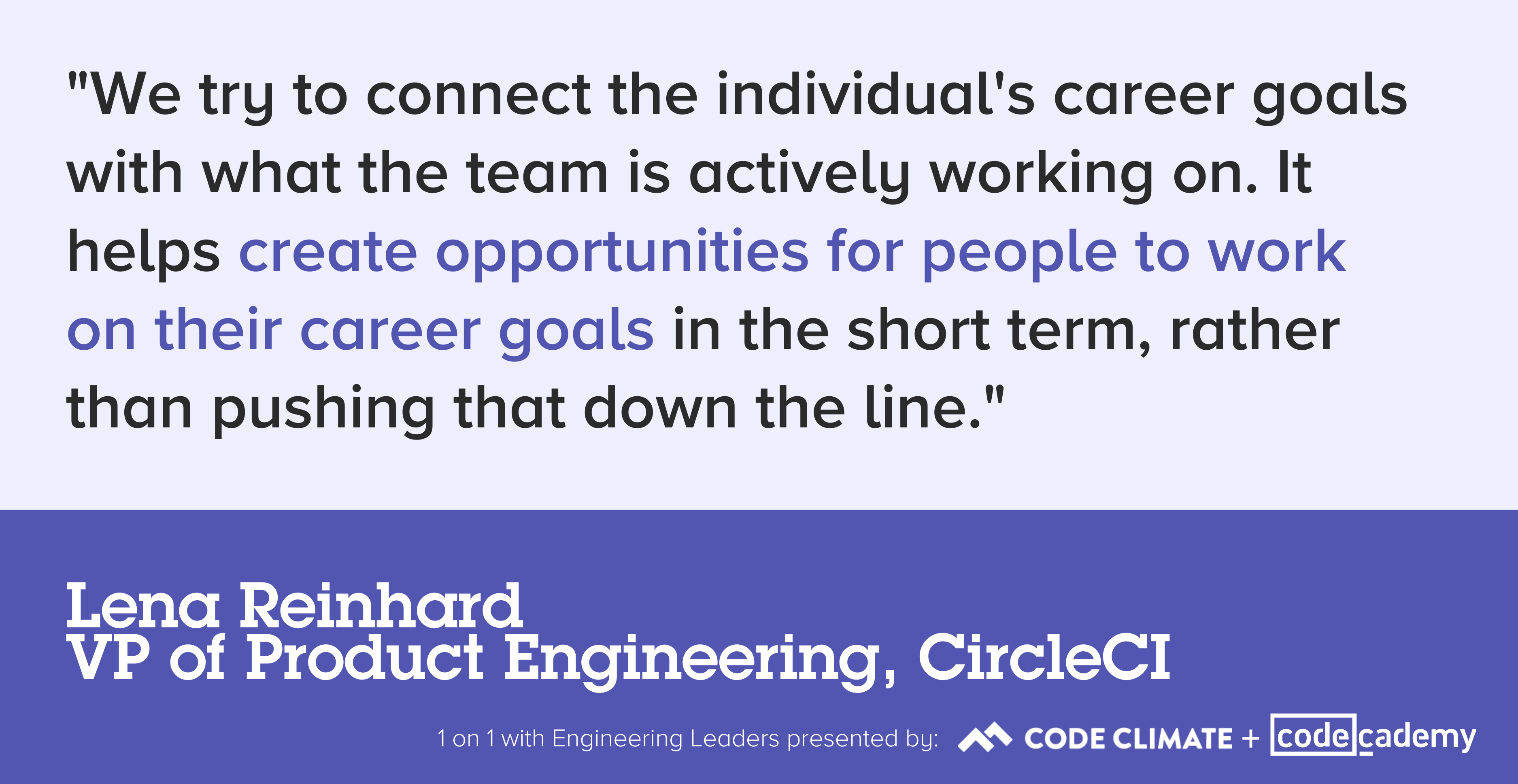
We also use a lot of other practices from DevOps around high-performing teams and DevOps culture. So things like retrospectives. Check-ins on the team side are really important as well. Teams need to connect and build relationships and focus on learning continuously together.
We also have an internal mentoring program, and have expectations in the career growth framework around learning to be a mentor or mentee.
Do you use engineering metrics at all on your team?
Yeah. We make a CI/CD product, it would be a shame if we didn’t.
That’s very true. Can you elaborate a little more on how you use them, and how that works on your team?
We have been moving towards using more and more metrics over time. For me, that’s just been a part of maturing as an organization. I also think it’s a natural side effect of growing to a point where not everyone knows what’s going on everywhere at all times anymore. Plus, I also think part of maturing is about evolving our practices, and measuring what matters is a good industry practice. It’s probably one of the better ones. So yeah, we’ve been gradually quantifying much more.
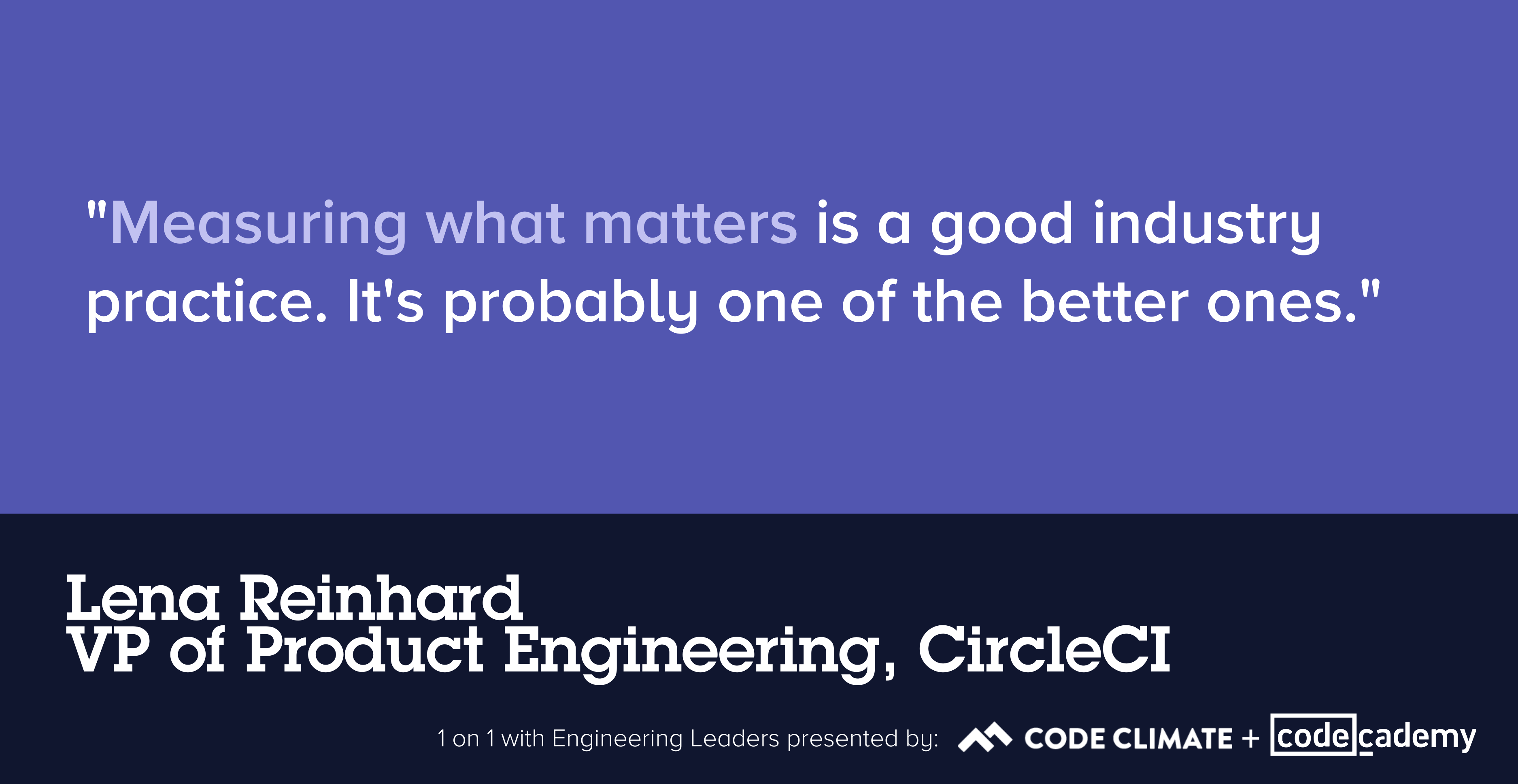
We use OKRs. We are also building out technical backlogs for the teams with technical initiatives with measurable impact. We utilize different delivery metrics and engineering metrics, including the standard DevOps metrics set, as well as others around team health, and services health. It’s a relatively broad set, and I would also say it keeps evolving. We use them, in addition to them being good practice, because we’re evolving as an organization.
They’ve become an increasingly important factor in measuring team health and the overall health of the organization, because it helps us understand how teams are doing against their goals. But also, for example, we measure how the teams are investing their capacity across new features, escalations, and technical debt and maintenance. It helps us plan. It also helps from a staffing perspective, knowing if teams are in need of more support.
So yeah, metrics are a good tool for both spot-checks on the current state, as well as for planning. It helps in terms of understanding how long work is out, how well we’re doing on estimating our ability to deliver, how long things are going to take, those kinds of things.
What advice do you have for new managers, or for people who are looking to change their career path and become a manager?
I’d say learn a lot and try to constantly level up. Like I read different newsletters, I read books. Books on management and all facets of it. I’ve also been working with career coaches for many years. I’d say, it’s more of a pull situation than a push situation. People aren’t necessarily going to give a lot of support, and in many organizations there’s no structured growth frameworks. So finding ways to level up is really important.
Investing in building relationships is also really crucial, especially in distributed teams. Make sure to build connections with important stakeholders, and of course with the team that you’re leading as well. But the relationships are going to be the main currency that helps a manager be successful.
One point that I’ve coached a lot of engineers through has been recalibrating internal success measures, and what makes them feel accomplished. For me at least, being successful in my role is helping others succeed, but also that’s very different from pushing code to production once a day. In many cases the results take much longer, especially when you work at the organizational level; initiatives take a long time, things I work on may never actually come true. So finding ways to feel successful and to get a sense of accomplishment, especially when you’ve moved from an engineer role into management, is really important.
I have, in the past with people who I’ve coached with, I’ve basically pursued two angles. One is basically just being conscious of that happening and understanding that it’s a common feeling in such a career transition, but also setting clear goals and expectations, both for your own work and for the people who are reporting to you. And then it’s also about connecting with what motivated you to move into a management role — what are the things that made it attractive for you, and how can you get more of that?
The other main thing for such a transition is just always making sure you’re very clear on expectations and goals. You have to know what’s expected and what the business goals are, as well as be clear with people who reporting to you. So much of management going wrong is just expectations that are going sideways, and that can usually more easily be prevented than fixed afterwards.
For more of Lena’s advice for the next generation, visit the Codecademy blog.

Related Articles

Navigating the world of software engineering or developer productivity insights can feel like trying to solve a complex puzzle, especially for large-scale organizations. It's one of those areas where having a cohesive strategy can make all the difference between success and frustration. Over the years, as I’ve worked with enterprise-level organizations, I’ve seen countless instances where a lack of strategy caused initiatives to fail or fizzle out.
In my latest webinar, I breakdown the key components engineering leaders need to consider when building an insights strategy.
Why a Strategy Matters
At the heart of every successful software engineering team is a drive for three things:
- A culture of continuous improvement
- The ability to move from idea to impact quickly, frequently, and with confidence
- A software organization delivering meaningful value
These goals sound simple enough, but in reality, achieving them requires more than just wishing for better performance. It takes data, action, and, most importantly, a cultural shift. And here's the catch: those three things don't come together by accident.
In my experience, whenever a large-scale change fails, there's one common denominator: a lack of a cohesive strategy. Every time I’ve witnessed a failed attempt at implementing new technology or making a big shift, the missing piece was always that strategic foundation. Without a clear, aligned strategy, you're not just wasting resources—you’re creating frustration across the entire organization.
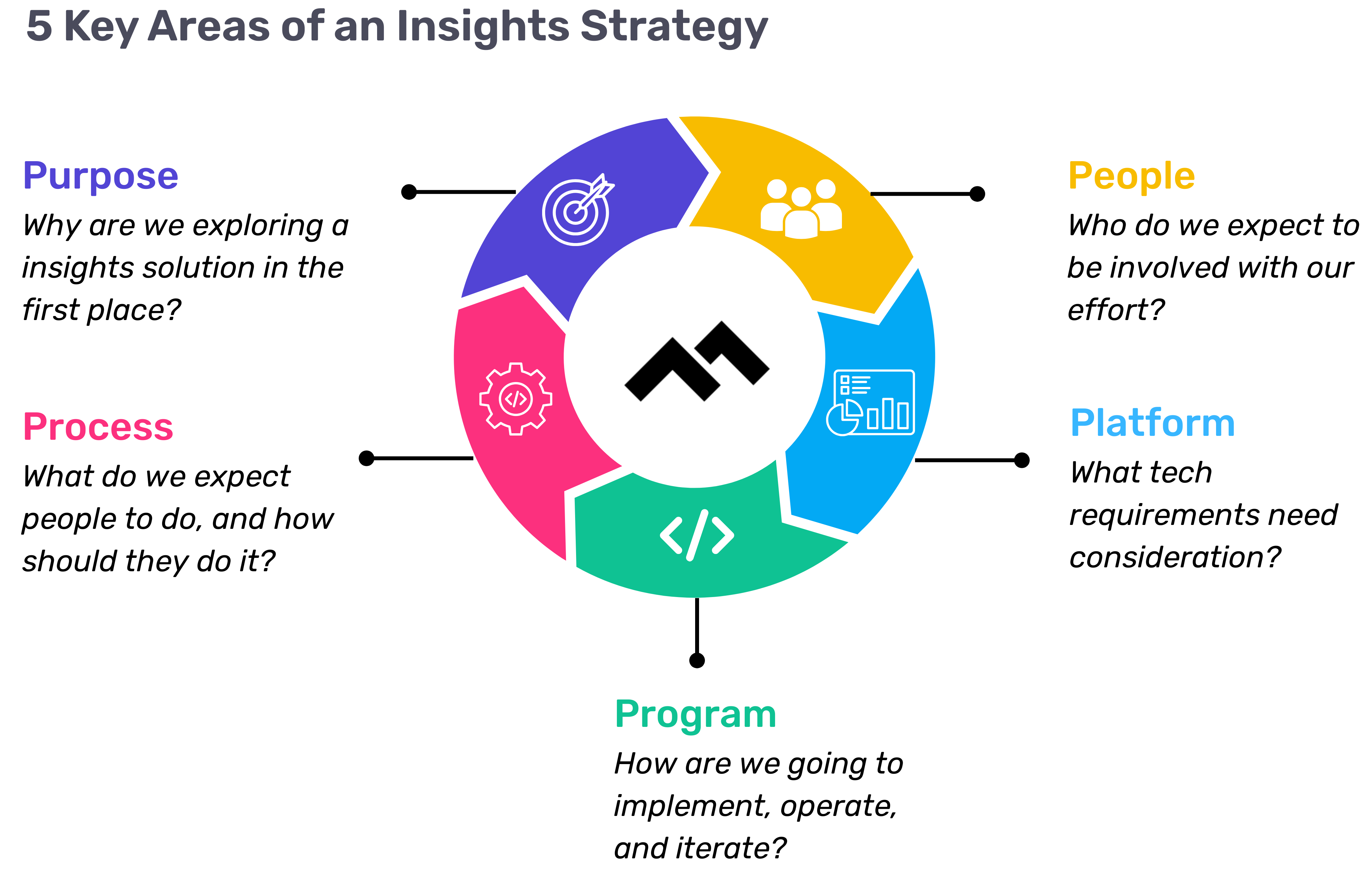
Sign up for a free, expert-led insights strategy workshop for your enterprise org.
Step 1: Define Your Purpose
The first step in any successful engineering insights strategy is defining why you're doing this in the first place. If you're rolling out developer productivity metrics or an insights platform, you need to make sure there’s alignment on the purpose across the board.
Too often, organizations dive into this journey without answering the crucial question: Why do we need this data? If you ask five different leaders in your organization, are you going to get five answers, or will they all point to the same objective? If you can’t answer this clearly, you risk chasing a vague, unhelpful path.
One way I recommend approaching this is through the "Five Whys" technique. Ask why you're doing this, and then keep asking "why" until you get to the core of the problem. For example, if your initial answer is, “We need engineering metrics,” ask why. The next answer might be, “Because we're missing deliverables.” Keep going until you identify the true purpose behind the initiative. Understanding that purpose helps avoid unnecessary distractions and lets you focus on solving the real issue.
Step 2: Understand Your People
Once the purpose is clear, the next step is to think about who will be involved in this journey. You have to consider the following:
- Who will be using the developer productivity tool/insights platform?
- Are these hands-on developers or executives looking for high-level insights?
- Who else in the organization might need access to the data, like finance or operations teams?
It’s also crucial to account for organizational changes. Reorgs are common in the enterprise world, and as your organization evolves, so too must your insights platform. If the people responsible for the platform’s maintenance change, who will ensure the data remains relevant to the new structure? Too often, teams stop using insights platforms because the data no longer reflects the current state of the organization. You need to have the right people in place to ensure continuous alignment and relevance.
Step 3: Define Your Process
The next key component is process—a step that many organizations overlook. It's easy to say, "We have the data now," but then what happens? What do you expect people to do with the data once it’s available? And how do you track if those actions are leading to improvement?
A common mistake I see is organizations focusing on metrics without a clear action plan. Instead of just looking at a metric like PR cycle times, the goal should be to first identify the problem you're trying to solve. If the problem is poor code quality, then improving the review cycle times might help, but only because it’s part of a larger process of improving quality, not just for the sake of improving the metric.
It’s also essential to approach this with an experimentation mindset. For example, start by identifying an area for improvement, make a hypothesis about how to improve it, then test it and use engineering insights data to see if your hypothesis is correct. Starting with a metric and trying to manipulate it is a quick way to lose sight of your larger purpose.
Step 4: Program and Rollout Strategy
The next piece of the puzzle is your program and rollout strategy. It’s easy to roll out an engineering insights platform and expect people to just log in and start using it, but that’s not enough. You need to think about how you'll introduce this new tool to the various stakeholders across different teams and business units.
The key here is to design a value loop within a smaller team or department first. Get a team to go through the full cycle of seeing the insights, taking action, and then quantifying the impact of that action. Once you've done this on a smaller scale, you can share success stories and roll it out more broadly across the organization. It’s not about whether people are logging into the platform—it’s about whether they’re driving meaningful change based on the insights.
Step 5: Choose Your Platform Wisely
And finally, we come to the platform itself. It’s the shiny object that many organizations focus on first, but as I’ve said before, it’s the last piece of the puzzle, not the first. Engineering insights platforms like Code Climate are powerful tools, but they can’t solve the problem of a poorly defined strategy.
I’ve seen organizations spend months evaluating these platforms, only to realize they didn't even know what they needed. One company in the telecom industry realized that no available platform suited their needs, so they chose to build their own. The key takeaway here is that your platform should align with your strategy—not the other way around. You should understand your purpose, people, and process before you even begin evaluating platforms.
Looking Ahead
To build a successful engineering insights strategy, you need to go beyond just installing a tool. An insights platform can only work if it’s supported by a clear purpose, the right people, a well-defined process, and a program that rolls it out effectively. The combination of these elements will ensure that your insights platform isn’t just a dashboard—it becomes a powerful driver of change and improvement in your organization.
Remember, a successful software engineering insights strategy isn’t just about the tool. It’s about building a culture of data-driven decision-making, fostering continuous improvement, and aligning all your teams toward achieving business outcomes. When you get that right, the value of engineering insights becomes clear.
Want to build a tailored engineering insights strategy for your enterprise organization? Get expert recommendations at our free insights strategy workshop. Register here.
Andrew Gassen has guided Fortune 500 companies and large government agencies through complex digital transformations. He specializes in embedding data-driven, experiment-led approaches within enterprise environments, helping organizations build a culture of continuous improvement and thrive in a rapidly evolving world.
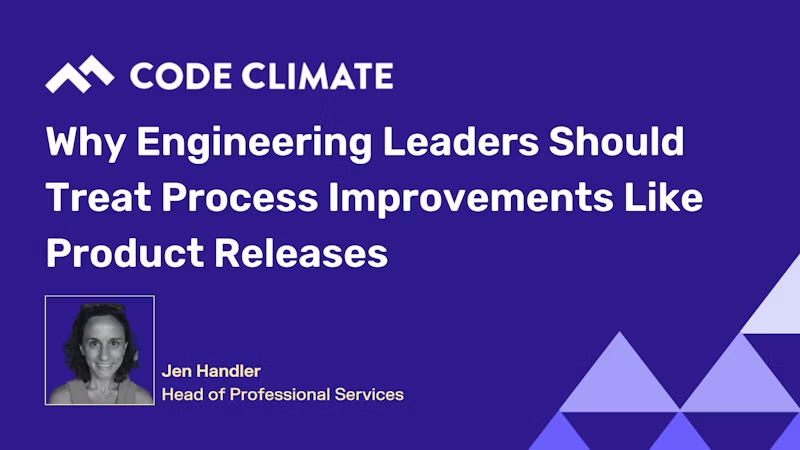
Most organizations are great at communicating product releases—but rarely do the same for process improvements that enable those releases. This is a missed opportunity for any leader wanting to expand “growth mindset,” as curiosity and innovation is as critical for process improvement as it is product development.
Curiosity and innovation aren’t limited to product development. They’re just as essential in how your teams deliver that product. When engineering and delivery leaders share what they’re doing to find efficiencies and unclog bottlenecks, they not only improve Time to Value — they help their peers level up too.
Create Buzz Around Process Wins
Below is a template leaders can use via email or communication app (Slack, Microsoft Teams) to share process changes with their team. I’ve personally seen updates like this generate the same level of energy as product announcements—complete with clap emojis👏 and follow-up pings like “Tell me more!” Even better, they’re useful for performance reviews and make great resume material for the leads who author them (excluding any sensitive or proprietary content, of course).
Subject: [Experiment update]
[Date]
Experiment Lead: [Name]
Goal: [Enter the longer term goal your experiment was in service of]
Opportunity: [Describe a bottleneck or opportunity you identified for some focused improvement]
Problem: [Describe the specific problem you aimed to solve]
Solution: [Describe the very specific solution you tested]
Metric(s): [What was the one metric you determined would help you know if your solution solved the problem? Were there any additional metrics you kept track of, to understand how they changed as well?]
Action: [Describe, in brief, what you did to get the result]
Result: [What was the result of the experiment, in terms of the above metrics?]
Next Step: [What will you do now? Will you run another experiment like this, design a new one, or will you rollout the solution more broadly?]
Key Learnings: [What did you learn during this experiment that is going to make your next action stronger?]
Please reach out to [experiment lead’s name] for more detail.
Sample Use Case
Subject: PR Descriptions Boost Review Speed by 30%
March 31, 2025
Experiment Lead: Mary O’Clary
Goal: We must pull a major capability from Q4 2024 into Q2 2025 to increase our revenue. We believe we can do this by improving productivity by 30%.
Opportunity: We found lack of clear descriptions were a primary cause of churn & delay during the review cycle. How might we improve PR descriptions, with information reviewers need?
Problem: Help PR Reviewers more regularly understand the scope of PRs, so they don’t need to ask developers a bunch of questions.
Solution: Issue simple guidelines for what we are looking for PR descriptions
Metric(s): PR Review Speed. We also monitored overall PR Cycle Time, assuming it would also improve for PRs closed within our experiment timeframe.
Action: We ran this experiment over one 2 week sprint, with no substantial changes in complexity of work or composition of the team. We kept the timeframe tight to help eliminate additional variables.
Result: We saw PR Review Speed increase by 30%
Next Step: Because of such a great result and low perceived risk, we will roll this out across Engineering and continue to monitor both PR Review Speed & PR Cycle Time.
Key Learnings: Clear, consistent PR descriptions reduce reviewer friction without adding developer overhead, giving us confidence to expand this practice org-wide to help accelerate key Q2 2025 delivery.
Please reach out to Mary for more detail.
How Make This Process Stick
My recommendation is to appoint one “editor in chief” to issue these updates each week. They should CC the experiment lead on the communication to provide visibility. In the first 4-6 weeks, this editor may need to actively solicit reports and coach people on what to share. This is normal—you’re building a new behavior. During that time, it's critical that managers respond to these updates with kudos and support, and they may need to be prompted to do so in the first couple of weeks.
If these updates become a regular ritual, within ~3 months, you’ll likely have more contributions than you can keep up with. That’s when the real cultural shift happens: people start sharing without prompting, and process improvement becomes part of how your org operates.
I’ve seen this work in large-scale organizations, from manufacturing to healthcare. Whether your continuous improvement culture is just getting started or already mature, this small practice can help you sustain momentum and deepen your culture of learning.
Give it a shot, and don’t forget to celebrate the wins along the way.
Jen Handler is the Head of Professional Services at Code Climate. She’s an experienced technology leader with 20 years of building teams that deliver outcome-driven products for Fortune 50 companies across industries including healthcare, hospitality, retail, and finance. Her specialties include goal development, lean experimentation, and behavior change.

Output is not the same as impact. Flow is not the same as effectiveness. Most of us would agree with these statements—so why does the software industry default to output and flow metrics when measuring success? It’s a complex issue with multiple factors, but the elephant in the room is this: mapping engineering insights to meaningful business impact is far more challenging than measuring developer output or workflow efficiency.
Ideally, data should inform decisions. The problem arises when the wrong data is used to diagnose a problem that isn’t the real issue. Using misaligned metrics leads to misguided decisions, and unfortunately, we see this happen across engineering organizations of all sizes. While many companies have adopted Software Engineering Intelligence (SEI) platforms—whether through homegrown solutions or by partnering with company that specializes in SEI like Code Climate—a clear divide has emerged. Successful and mature organizations leverage engineering insights to drive real improvements, while others collect data without extracting real value—or worse, make decisions aimed solely at improving a metric rather than solving a real business challenge.
From our experience partnering with large enterprises with complex structures and over 1,000 engineers, we’ve identified three key factors that set high-performing engineering organizations apart.
1. Treating Software Engineering Insights as a Product
When platform engineering first emerged, early innovators adopted the mantra of “platform as a product” to emphasize the key principles that drive successful platform teams. The same mindset applies to Software Engineering Intelligence (SEI). Enterprise organizations succeed when they treat engineering insights as a product rather than just a reporting tool.
Data shouldn’t be collected for the sake of having it—it should serve a clear purpose: helping specific users achieve specific outcomes. Whether for engineering leadership, product teams, or executive stakeholders, high-performing organizations ensure that engineering insights are:
- Relevant – Focused on what each audience actually needs to know.
- Actionable – Providing clear next steps, not just numbers.
- Timely – Delivered at the right moment to drive decisions.
Rather than relying on pre-built dashboards with generic engineering metrics, mature organizations customize reporting to align with team priorities and business objectives.
For example, one of our healthcare customers is evaluating how AI coding tools like GitHub Copilot and Cursor might impact their hiring plans for the year. They have specific questions to answer and are running highly tailored experiments, making a custom dashboard essential for generating meaningful, relevant insights. With many SEI solutions, they would have to externalize data into another system or piece together information from multiple pages, increasing overhead and slowing down decision-making.
High-performing enterprise organizations don’t treat their SEI solution as static. Team structures evolve, business priorities shift, and engineering workflows change. Instead of relying on one-size-fits-all reporting, they continuously refine their insights to keep them aligned with business and engineering goals. Frequent iteration isn’t a flaw—it’s a necessary feature, and the best organizations design their SEI operations with this in mind.
2. The Value of Code is Not the Code
Many software engineering organizations focus primarily on code-related metrics, but writing code is just one small piece of the larger business value stream—and rarely the area with the greatest opportunities for improvement. Optimizing code creation can create a false sense of progress at best and, at worst, introduce unintended bottlenecks that negatively impact the broader system.
High-performing engineering organizations recognize this risk and instead measure the effectiveness of the entire system when evaluating the impact of changes and decisions. Instead of focusing solely on PR cycle time or commit activity, top-performing teams assess the entire journey:
- Idea generation – How long does it take to move from concept to development?
- Development process – Are teams working efficiently? Are bottlenecks slowing down releases?
- Deployment & adoption – Once shipped, how quickly is the feature adopted by users?
- Business outcomes – Did the feature drive revenue, retention, or efficiency improvements?
For example, reducing code review time by a few hours may seem like an efficiency win, but if completed code sits for six weeks before deployment, that improvement has little real impact. While this may sound intuitive, in practice, it’s far more complicated—especially in matrixed or hierarchical organizations, where different teams own different parts of the system. In these environments, it’s often difficult, though not impossible, for one group to influence or improve a process owned by another.
One of our customers, a major media brand, had excellent coding metrics yet still struggled to meet sprint goals. While they were delivering work at the expected rate and prioritizing the right items, the perception of “failed sprints” persisted, creating tension for engineering leadership. After further analysis, we uncovered a critical misalignment: work was being added to team backlogs after sprints had already started, without removing any of the previously committed tasks. This shift in scope wasn’t due to engineering inefficiency—it stemmed from the business analysts' prioritization sessions occurring after sprint commitments were made. A simple rescheduling of prioritization ceremonies—ensuring that business decisions were finalized before engineering teams committed to sprint goals. This small yet system-wide adjustment significantly improved delivery consistency and alignment—something that wouldn’t have been possible without examining the entire end-to-end process.
3. Shifting from Tactical Metrics to Strategy
There are many frameworks, methodologies, and metrics often referenced as critical to the engineering insights conversation. While these can be useful, they are not inherently valuable on their own. Why? Because it all comes down to strategy. Focusing on managing a specific engineering metric or framework (i.e. DORA or SPACE) is missing the forest for the trees. Our most successful customers have a clear, defined, and well-communicated strategy for their software engineering insights program—one that doesn’t focus on metrics by name. Why? Because unless a metric is mapped to something meaningful to the business, it lacks the context to be impactful.
Strategic engineering leaders at large organizations focus on business-driven questions, such as:
- Is this engineering investment improving customer experience?
- Are we accelerating revenue growth?
- Is this new approach or tool improving cross-functional collaboration?
Tracking software engineering metrics like cycle time, PR size, or deployment frequency can be useful indicators, but they are output metrics—not impact metrics. Mature organizations go beyond reporting engineering speed and instead ask: "Did this speed up product releases in a way that drove revenue?"
While challenging to measure, this is where true business value lies. A 10% improvement in cycle time may indicate progress, but if sales remain flat, did it actually move the needle? Instead of optimizing isolated metrics, engineering leaders should align their focus with overarching business strategy. If an engineering metric doesn’t directly map to a key strategic imperative, it’s worth reevaluating whether it’s the right thing to measure.
One of our retail customers accelerated the release of a new digital capability, allowing them to capture additional revenue a full quarter earlier than anticipated. Not only did this directly increase revenue, but the extended timeline of revenue generation created a long-term financial impact—a result that finance teams, investors, and the board highly valued. The team was able to trace their decisions back to insights derived from their engineering data, proving the direct connection between software delivery and business success.
Understanding the broader business strategy isn’t optional for high-performing engineering organizations—it’s a fundamental requirement. Through our developer experience surveys, we’ve observed a significant difference between the highest-performing organizations and the rest as it relates to how well developers understand the business impact they are responsible for delivering. Organizations that treat engineers as task-takers, isolated from business impact, consistently underperform—even if their coding efficiency is exceptional. The engineering leaders at top-performing organizations prioritize alignment with strategy and avoid the distraction of tactical metrics that fail to connect to meaningful business outcomes.
Learn how to shift from micro engineering adjustments to strategic business impact. Request a Code Climate Diagnostic.

Code Climate has supported thousands of engineering teams of all sizes over the past decade, enhancing team health, advancing DevOps practices, and providing visibility into engineering processes. According to Gartner®, the Software Engineering Intelligence (SEI) platform market is expanding as engineering leaders increasingly leverage these platforms to enhance productivity and drive business value. As pioneers in the SEI space, the Code Climate team has identified three key takeaways from partnerships with our Fortune 100 customers:
- Engineering Metrics Are Not Enough
- Engineering leaders that adopt a Software Engineering Intelligence (SEI) platform without a proper SEI strategy fail to extract value from the data
- Engineering leaders that adopt quantitative metrics without qualitative measures are missing the full picture
- Engineering leaders that adopt a Software Engineering Intelligence (SEI) platform without a proper SEI strategy fail to extract value from the data
- Hands-Off Approach Falls Short
- Approaching an SEI platform as a traditional turnkey SaaS product does not ensure team success
- Organizations that lack collaboration with an SEI solutions provider often struggle to drive adoption and understanding of engineering insights
- Approaching an SEI platform as a traditional turnkey SaaS product does not ensure team success
- Insights Alone Do Not Drive Outcomes
- Engineering leaders often struggle to translate insights from an SEI platform into actionable steps
- Engineering leaders often struggle to align engineering performance to meaningful business outcomes
- Engineering leaders often struggle to translate insights from an SEI platform into actionable steps
Empowering Engineering Leaders at Enterprise Organizations
The above takeaways have prompted a strategic shift in Code Climate’s roadmap, now centered on enterprise organizations with complex engineering team structure and workflows. As part of this transition, our flagship Software Engineering Intelligence (SEI) platform, Velocity, is now replaced by an enhanced SEI platform, custom-designed for each leader and their organization. With enterprise-level scalability, Code Climate provides senior engineering leaders complete autonomy over their SEI platform, seamlessly integrating into their workflows while delivering the customization, flexibility, and reliability needed to tackle business challenges.
Moreover, we understand that quantitative metrics from a data platform alone cannot transform an organization, which is why Code Climate is now a Software Engineering Intelligence Solutions Partner—offering five key characteristics that define our approach
- Tailored Solutions: We provide engineering solutions via quantitative insights and qualitative workshops that are specifically designed to meet the unique needs of enterprise engineering teams—moving beyond standard, black-box solutions.
- Strategic Collaboration: We enable our enterprise customers to build an SEI strategy, engaging with key stakeholders to align Code Climate’s solution and services with their broader business goals.
- Long-Term Partnership: Our strategic partnership with our enterprise customers is typically ongoing, focusing on long-term value rather than offering a standard insights platform. As an enterprise-level SEI solutions partner, we are invested in the sustained success of our customers.
- Expert Guidance: We offer expert guidance and actionable recommendations to help our enterprise customers navigate challenges, optimize performance, and achieve business goals.
- End-to-End Support: We provide comprehensive services, from advisory support and implementation to ongoing support and optimization.
A Message from the New CEO of Code Climate
"During my time at Pivotal Software, Inc., I met with hundreds of engineering executives who consistently asked, “How do I improve my software engineering organization?” These conversations revealed a universal challenge: aligning engineering efforts with business goals. I joined Code Climate because I'm passionate about helping enterprise organizations address these critical questions with actionable insights and data-driven strategies that empower engineering executives to drive meaningful change." - Josh Knowles, CEO of Code Climate
Ready to make data-driven engineering decisions to maximize business impact? Request a consultation.

Today, we’re excited to share that Code Climate Quality has been spun out into a new company: Qlty Software. Code Climate is now focused entirely on its next phase of Velocity, our Software Engineering Intelligence (SEI) solution for enterprise organizations
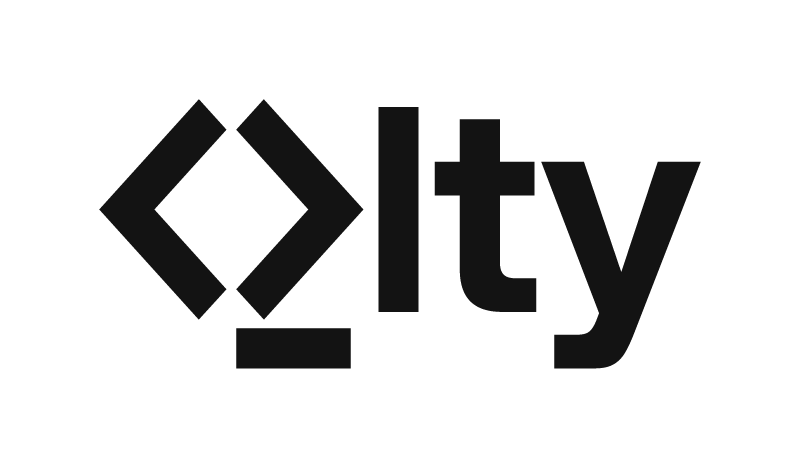
How It Started
I founded Code Climate in 2011 to help engineering teams level up with data. Our initial Quality product was a pioneer for automated code review, helping developers merge with confidence by bringing maintainability and code coverage metrics into the developer workflow.
Our second product, Velocity, was launched in 2018 as the first Software Engineering Intelligence (SEI) platform to deliver insights about the people and processes in the end-to-end software development lifecycle.
All the while, we’ve been changing the way modern software gets built. Quality is reviewing code written by tens of thousands of engineers, and Velocity is helping Fortune 500 companies drive engineering transformation as they adopt AI-enabled workflows.
Today, Quality and Velocity serve different types of software engineering organizations, and we are investing heavily in each product for their respective customers.
Where We're Going
To serve both groups better, we’re branching out into two companies. We’re thrilled to introduce Qlty Software, and to focus Code Climate on software engineering intelligence.
Over the past year, we’ve made more significant upgrades to Quality and our SEI platform, Velocity, than ever before. Much of that is limited early access, and we’ll have a lot to share publicly soon. As separate companies, each can double down on their products.
Qlty Software is dedicated to taking the toil out of code maintenance. The new company name represents our commitment to code quality. We’ve launched a new domain, with a brand new, enhanced edition of the Quality product.
I’m excited to be personally moving into the CEO role of Qlty Software to lead this effort. Josh Knowles, Code Climate’s General Manager, will take on the role of CEO of Code Climate, guiding the next chapter as an SEI solutions partner for technology leaders at large, complex organizations.
We believe the future of developer tools to review and improve code automatically is brighter than ever – from command line tools accelerating feedback loops to new, AI-powered workflows – and we’re excited to be on that journey with you.
-Bryan
CEO, Qlty Software
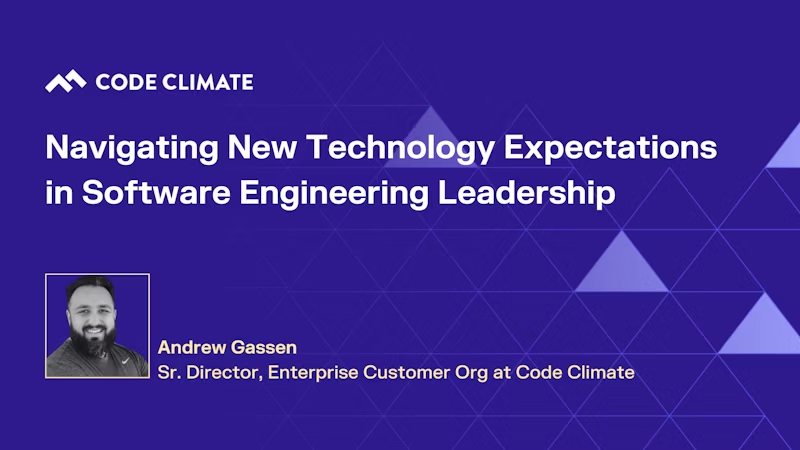
Technology is evolving very quickly but I don't believe it's evolving as quickly as expectations for it. This has become increasingly apparent to me as I've engaged in conversations with Code Climate's customers, who are senior software engineering leaders across different organizations. While the technology itself is advancing rapidly, the expectations placed on it are evolving at an even faster pace, possibly twice as quickly.
New Technology: AI, No-Code/Low-Code, and SEI Platforms
There's Generative AI, such as Copilot, the No-code/Low-code space, and the concept of Software Engineering Intelligence (SEI) platforms, as coined by Gartner®. The promises associated with these tools seem straightforward:
- Generative AI aims to accelerate, improve quality, and reduce costs.
- No-code and Low-code platforms promise faster and cheaper software development accessible to anyone.
- SEI platforms such as Code Climate enhance productivity measurement for informed decisions leading to faster, efficient, and higher-quality outcomes.
However, the reality isn’t as straightforward as the messaging may seem:
- Adopting Generative AI alone can lead to building the wrong things faster.
- No-code or Low-code tools are efficient until you hit inherent limitations, forcing cumbersome workarounds that reduce maintainability and create new challenges compared to native code development.
- As for SEI platforms, as we've observed with our customers, simply displaying data isn't effective if you lack the strategies to leverage it.
When I joined Code Climate a year ago, one recurring question from our customers was, "We see our data, but what's the actionable next step?" While the potential of these technologies is compelling, it's critical to address and understand their practical implications. Often, business or non-technical stakeholders embrace the promises while engineering leaders, responsible for implementation, grapple with the complex realities.
Navigating New Technology Expectations and Realities
Software engineering leaders now face increased pressure to achieve more with fewer resources, often under metrics that oversimplify their complex responsibilities. It's no secret that widespread layoffs have affected the technology industry in recent years. Despite this, the scope of their responsibilities and the outcomes expected from them by the business haven't diminished. In fact, with the adoption of new technologies, these expectations have only increased.
Viewing software development solely in terms of the number of features produced overlooks critical aspects such as technical debt or the routine maintenance necessary to keep operations running smoothly. Adding to that, engineering leaders are increasingly pressured to solve non-engineering challenges within their domains. This disconnect between technical solutions and non-technical issues highlights a fundamental gap that can't be bridged by engineering alone—it requires buy-in and understanding from all stakeholders involved.
This tension isn't new, but it's becoming front-and-center thanks to the promises of new technologies mentioned above. These promises create higher expectations for business leaders, which, in turn, trickle down to engineering leaders who are expected to navigate these challenges, which trickle down to the teams doing the work. Recently, I had a conversation with a Code Climate customer undergoing a significant adoption of GitHub Copilot, a powerful tool. This particular leader’s finance team told her, "We bought this new tool six months ago and you don't seem to be operating any better. What's going on?" This scenario reflects the challenges many large engineering organizations face.
Navigating New Technology Challenges and Taking Action
Here's how Code Climate is helping software engineering leaders take actionable steps to address challenges with new technology:
- Acknowledging the disconnect with non-technical stakeholders, fostering cross-functional alignment and realistic expectations. Facilitating open discussions between technology and business leaders, who may never have collaborated before, is crucial for progress.
- Clearly outlining the broader scope of engineering challenges beyond just writing code—evaluating processes like approval workflows, backlog management, and compliance mandates. This holistic view provides a foundation for informed discussions and solutions.
- Establishing a shared understanding and language for what constitutes a healthy engineering organization is essential.
In addition, we partner with our enterprise customers to experiment and assess the impact of new technologies. For instance, let's use the following experiment template to justify the adoption of Copilot:
We believe offering Copilot to _______ for [duration] will provide sufficient insights to inform our purchasing decision for a broader, organization-wide rollout.
We will know what our decision is if we see ______ increase/decrease.
Let’s fill in the blanks:
We believe offering Copilot to one portfolio of 5 teams for one quarter will provide sufficient insights to inform our purchasing decision for a broader, organization-wide rollout.
We will know what our decision is if we see:
- An increase in PR Throughput
- A decrease in Cycle Time
- No negative impact to Rework
- No negative impact to Defect Rate
Andrew Gassen leads Code Climate's enterprise customer organization, partnering with engineering leaders for organization-wide diagnostics to identify critical focus areas and provide customized solutions. Request a consultation to learn more.
